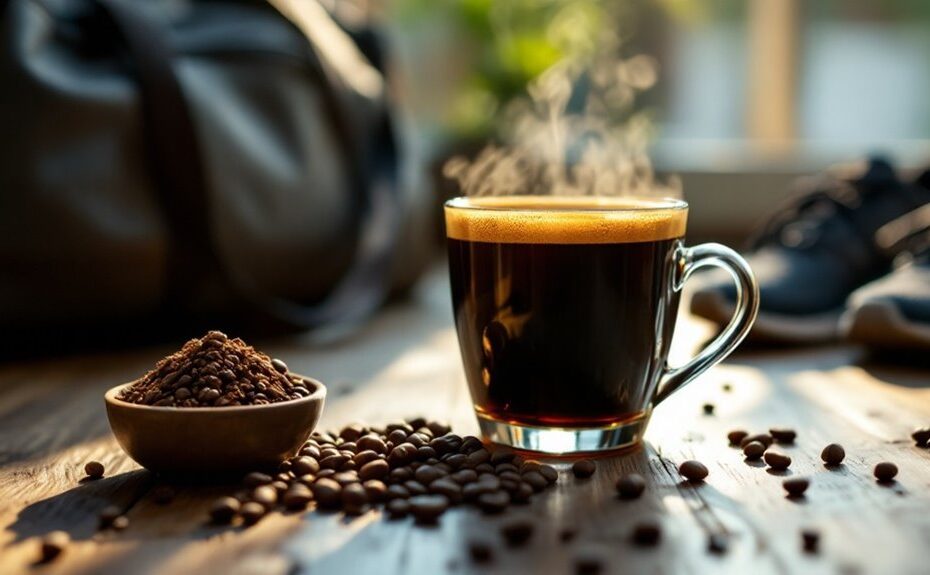



When choosing coffee for your pre-workout, you'll want to focus on simplicity and effectiveness. Black coffee or espresso offers a clean caffeine boost without added sugars or calories that could weigh you down. Cold brew might be your go-to if you're sensitive to acidity, as it's smoother and gentler on your stomach. Timing and dosage matter too—aim for 135–405 mg of caffeine about 45–60 minutes before you hit the gym. But what happens if you pick the wrong type or overdo it? The answer could make or break your workout.
Key Takeaways
- Black coffee is ideal for pre-workout due to its low-calorie, additive-free nature and high caffeine content for energy and focus.
- Espresso provides concentrated caffeine (63–125 mg per shot) for quick energy without added calories or digestive discomfort.
- Cold brew offers a smooth, low-acid option with higher caffeine concentration, reducing stomach upset during intense workouts.
- Optimal caffeine intake is 3–6 mg per kg of body weight, consumed 45–60 minutes before exercise for peak performance benefits.
- Avoid flavored or sweetened coffees to prevent unnecessary calorie intake and energy crashes during workouts.
Benefits of Coffee Before Exercise
While many turn to pre-workout supplements, coffee offers a natural and effective way to boost exercise performance. The caffeine in coffee enhances energy levels by stimulating your central nervous system, helping you feel more alert and focused during your workout. Studies show coffee can improve exercise performance by 11-12%, increasing muscular strength, power, and endurance. It also promotes fat oxidation, allowing your body to use fat as fuel, which spares glycogen stores for longer, more intense sessions. Whether you're lifting weights or running, a single cup of coffee (about 100 mg of caffeine) can elevate your aerobic endurance, sprinting, and jumping performance. By choosing coffee as your pre-workout, you're fueling your body with a nutrient-rich option that supports both energy and exercise efficiency.
Optimal Timing and Dosage for Pre-Workout Coffee
To maximize the benefits of coffee as a pre-workout, timing and dosage are key factors to evaluate. Aim to consume your pre-workout coffee 45–60 minutes before your workout to allow peak caffeine absorption. For peak performance, target a caffeine intake of 2–6 mg per kilogram of body weight, which translates to 135–405 mg for a 150-pound person. Start with a lower amount of caffeine, around 135–200 mg, to assess tolerance. This caffeine consumption aligns with 1–2 cups of coffee before exercising for most individuals. Adjust your pre-workout caffeine dosage based on your body weight and sensitivity, ensuring it supports your energy needs without overstimulation. Experiment with timing and mg per kilogram to find the balance that enhances your workout performance effectively.
Potential Downsides of Coffee Before Workouts
Drinking coffee before workouts can cause digestive discomfort, such as acid reflux or stomach upset, due to its acidic nature and slowed digestion during exercise. If consumed too late in the day, caffeine may disrupt your sleep, impairing recovery and hindering long-term fitness goals. Be mindful of your timing and caffeine sensitivity to avoid these potential downsides.
Digestive Discomfort Risks
Although coffee is a popular pre-workout choice, it can lead to digestive discomfort for some individuals. Drinking coffee on an empty stomach may trigger acid reflux or heartburn, as caffeine stimulates gastric acid production. This can worsen gastrointestinal issues like cramping, diarrhea, or bloating, especially during intense exercise. If you add creamers or sweeteners, the risk of indigestion increases further. Those with sensitive stomachs or conditions like IBS may find pre-workout coffee exacerbates symptoms, making workouts uncomfortable. To minimize risks, consider consuming coffee with a small snack or opting for low-acid varieties. Pay attention to how your body responds, as individual tolerance varies. Adjusting timing or quantity can help you enjoy coffee's benefits without compromising your digestive health.
Sleep Disruption Concerns
Coffee's stimulating effects can linger long after your workout, potentially interfering with sleep. Using coffee before a workout stimulates your central nervous system, enhancing alertness and athletic performance, but its side effects can disrupt your sleep cycle. Caffeine has a half-life of 5 hours, meaning 50% of it remains in your system hours after consumption, delaying sleep onset and reducing sleep quality. Even moderate coffee consumption (200 mg) 6 hours before bed can impair sleep efficiency, hindering recovery and muscle repair. If you're sensitive to caffeine or metabolize it slowly, pre-workout coffee may worsen sleep disturbances. To avoid these issues, time your pre-workout drink or supplements carefully, ensuring they don't interfere with your rest, which is critical for peak performance and recovery.
Types of Coffee Ideal for Pre-Workout
Black coffee is a top choice for pre-workout because it's low in calories and free of additives, delivering a clean caffeine boost. Espresso packs a concentrated caffeine punch, perfect for quick, high-intensity efforts, while cold brew offers a smoother, sustained energy release for longer workouts. Each type provides unique benefits, so you can match your coffee to your fitness goals.
Black Coffee Benefits
When you're looking for a clean, effective pre-workout boost, black coffee stands out as a calorie-free option that delivers natural caffeine and antioxidants. As a coffee drinker, you'll appreciate its simplicity—brewed coffee provides a steady energy boost without added sugars or artificial ingredients. Its caffeine content enhances mental focus and endurance, making it ideal for resistance training or high-intensity workouts. Black coffee's low acidity reduces the risk of digestive issues, ensuring you stay comfortable during exercise. Rich in antioxidants, it supports recovery and overall health. You can adjust its strength and flavor by choosing different beans or brewing methods, tailoring it to your preferences. For a reliable pre-workout boost, black coffee offers a nutrient-focused, health-oriented solution.
Espresso for Energy
If you're seeking a potent, fast-acting pre-workout option, espresso delivers a concentrated dose of caffeine that can enhance energy and focus. A single shot contains about 63 mg of caffeine, while a double shot provides around 125 mg, aligning with the ideal pre-workout dose of 3-6 mg per kg of body weight. Its small volume guarantees quick caffeine absorption, boosting alertness and performance within 15-30 minutes. Espresso's low liquid content minimizes stomach discomfort, making it perfect for high-intensity workouts. You can enjoy it black or mix it into protein shakes for added benefits without compromising its effectiveness. This nutrient-dense option not only fuels your workout but also supports sustained energy and mental clarity, helping you maximize your training session.
Cold Brew Advantages
While espresso offers a quick caffeine kick, cold brew coffee stands out as a gentler yet equally effective pre-workout option, especially for those with sensitive stomachs. Its low acidity makes it easier to digest before intense workouts, reducing the risk of discomfort. Cold brew also packs a higher caffeine concentration, delivering a steady energy boost without the jitters. The slow brewing process extracts more antioxidants, which can aid in recovery and combat inflammation post-exercise. Served chilled, it's an invigorating choice for hydration, particularly in warm conditions. Additionally, its gradual caffeine release helps sustain energy levels, making it ideal for longer training sessions. With its nutrient-rich profile and smooth taste, cold brew is a smart, health-focused pick for fueling your workouts.
Alternatives to Coffee for Pre-Workout Energy
Although coffee is a popular pre-workout choice, several alternatives can provide sustained energy and performance benefits without relying on caffeine from coffee. Matcha green tea offers a steady energy boost with 35-70 mg of caffeine and L-theanine, enhancing focus without jitters. Yerba mate delivers 85 mg of caffeine per cup, packed with antioxidants, B vitamins, and magnesium for improved endurance. Beetroot juice increases nitric oxide production, boosting blood flow and oxygen delivery for better stamina. Caffeine pills provide a precise caffeine dose (100-200 mg) without acidity or calories. For a caffeine-free option, a B-vitamin complex supports energy metabolism, helping you power through workouts. These alternatives combine nutrients, antioxidants, and performance-enhancing compounds to fuel your exercise effectively.
How to Choose the Best Coffee for Your Workout
When selecting coffee for your workout, prioritize options that align with your fitness goals and digestive comfort. Choose black coffee or espresso shots for a low-calorie, high-caffeine energy boost that enhances workout performance without added sugars. If you prefer a smoother option, cold brew offers a less acidic profile and gradual caffeine release, ideal for endurance sessions. Always use high-quality coffee beans and fresh brewing methods to maximize caffeine content and flavor. For added recovery benefits, consider protein coffee blends, which combine caffeine with muscle-supporting protein. Avoid flavored or sweetened varieties, as they often contain unnecessary calories and additives that can hinder your progress. By focusing on nutrient-dense, low-calorie options, you'll optimize your pre-workout routine for sustained energy and better results.
Disclosure: As an Amazon Associate, I earn from qualifying purchases.





